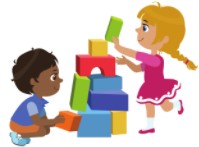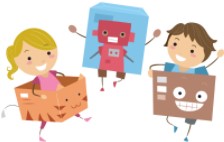Playing to Learn

 This website is designed to help early childcare providers better understand the importance of play. Below you will find a variety of resources to help children learn as they play including: infographics that break down types of play, easy to use, printable data sheets for the assessment of play, information on evidence-practices for supporting children’s play.
This website is designed to help early childcare providers better understand the importance of play. Below you will find a variety of resources to help children learn as they play including: infographics that break down types of play, easy to use, printable data sheets for the assessment of play, information on evidence-practices for supporting children’s play.
![]()
- Play is considered a behavioral cusp because it opens children up to opportunities for learning new skills. Play allows children to explore their environment, explore roles
 and relationships, develop awareness of emotions, and practice social skills.
and relationships, develop awareness of emotions, and practice social skills. - Play is culturally specific and occurs across all cultures world-wide.
- Children with and without disabilities require support to develop play skills.
![]()
![]()

Click here to access downloadable resources related to understanding the social play and object play taxonomies. You will find a general information on each taxonomy as well as guides to each type of play within those taxonomies.
![]()
Click here to access downloadable data collection sheets to monitor children’s play development.
![]()
Click here for more information on assessing children’s play to choose an appropriate intervention for supporting children’s play development.

Click here for information on evidence-based interventions to support children’s play development.
PTL was generously funded by the Caplan Foundation for Early Childhood.